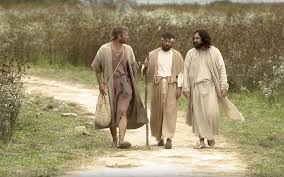 What is the most important question of human existence? If we have not yet discovered this, then we can be assured that we are not very far along toward answering the question.
What is the most important question of human existence? If we have not yet discovered this, then we can be assured that we are not very far along toward answering the question.
My six-year-old grandson Collin suffers from severe asthma. When he heard that asthma was a condition that made people more vulnerable to the COVID virus he was worried. Then there was the difficulty of understanding why he couldn’t run up and hug yia yia and papou like he is used too and all the other changes of sheltering in place.
His mother told him he was strong and would be able to overcome the disease if he got it and this seemed to satisfy him. Some weeks later they were taking a walk together and she asked him how he was handling all the changes that are part of our life under the cloud of COVID. He said “I don’t really understand everything. It is too much for me to think about and scares me, so I ignore it and pretend that everything is fine.”
In the midst of the enormous proportions of the cosmos, from its subatomic quantum mysteries to the extraordinary speed-of-light expansion, punctuated by exploding supernovas and infinitely contracting black holes, the meaning and purpose of the tiny ribbon of organic life on earth and its recapitulating fractals that have existed for only seconds in comparison to the great time line of the larger creation—a mere flash of extraordinary complexity, beauty and promise making its appearance–may simply be too much to think about as well.
And what of the multitude of creatures, seemingly alone in the galaxy, who have dwelled for a time upon this tiny blue-green jewel for only seconds in comparison to the length of life on earth–mere flashes of increasing complexity yet oblivious to the meaning and purpose of their place in the great unfolding mystery of existence?
And what of the particular ones who go by my name and yours; mere flashes of self-awareness, microcosms of the whole cosmos that appear for a brief moment and begin to ask, “What am I? Why am I here? These kinds of questions along with the question “Who am I?” arise only when existence becomes conscious that it is conscious. The question is complicated to a potentially terrifying degree with the realization that death will instantly remove us from the cosmic event; shutting the door to everything and at a moment and in a way that we have no control over whatsoever.
Most of the time, our consideration of these mysteries is a bit like my grandson’s response to COVID. It’s just too much to think about and all a bit unsettling, so we just pretend that it isn’t there and go on about our lives without giving much attention to anything beyond our immediate interests and activities without consideration of how they might be related to the rest. That’s okay in some ways, but it also leaves us shallow in our encounters with each other and with life.
Within the mystery and extraordinary potential of each human life, in the space between the dawning of awareness of coming to be and the certainty of ceasing to exist, there arises for the first time, the possibility to answer a very different but equally vital question. “Whose am I?” Without the possibility of ever encountering and finding relationship with an other in such a universe, getting an answer to all other questions misses the mark and existence becomes a living hell which we avoid by becoming slaves of our appetites and various other passions that serve as narcotics, leaving us little different than the beasts, or as Mark Twain rightly observed, far more dangerous because of the creativity of our intellects.
But before I can know whose I am; before the desire to offer myself can replace the need to preserve myself at all costs, there is still that question; the most important one of all. It’s the one that is always tapping at the door of our hearts, from just outside our awareness. Once finding ourselves alive, at any moment, this question has the potential to clarify the meaning and purpose of our lives. It sources all our inspiration and gives power to our endurance of the trials along the way. It is a variation of the question we think we are asking, but in reality, whatever we ask and for whatever reason, still faces the question that God asks of each of us and which we ignore at our own peril.
“Whom do you seek?”[1] is the question Jesus asks two of his future disciples when he discovers them following him. “What are you looking for?” Seems simple enough. We ask one another all the time, “Who are you?” and “What do you want?” Yet more often than not, we aren’t present in a way that can truly hear the response to the question beyond what we are already expecting. We can’t see beyond our own prejudices and desires. Or we don’t like the answer we get and refuse to continue the relationship if it involves questioning or changing any of our habits or beliefs by looking more deeply at things with the intention of becoming response-able for what we discover. The terrible irony of this is that it is shame over not feeling good enough, not being able to love enough, fear of not being response-able enough that causes us to avoid risking love. It is our failure to love as we most deeply desire and the consequent emptiness of our lives as a result, of which we are most ashamed. It is a vicious circle.
Without the willingness and interest to be questioned, to not know with attention and loving interest, gradually we lose the capacity to be surprised by anything. We begin to shrink-wrap the world and the persons we are closest too in the form of what we have already experienced. This destroys a lot of marriages. Dialogue ceases because spouses don’t expect any further variation. Why pay attention any longer? “You always say that or you never do that…” Those two words in an exchange are a sign that monologue is occurring and as Martin Buber succinctly pointed out, “Monologue is Lucifer.”
When we are seeking to find out who Jesus Christ is, the first thing we must realize is that the answer we get depends on our response to the question he asks us. Fr. Georges Florovsky wrote, “No one profits by the Gospels unless he be first in love with Christ. For Christ is not a text but a living Person, and he abides in his Body, the Church”[2] Without love there is no prayer; there is no dialogue; there is no communion.
I cannot discover who Jesus is by memorizing Scripture and learning everything there is to know about him historically, by philosophically reasoning about him or by studying his DNA and genetic code. Neither can I know any other person in these ways. Knowledge of “who I am seeking” is a function of the communion of love, not of my experience of the other based on judgments and determinations.
It is not the certainty of infallible knowledge that I think I possess about someone as a something, an object of study or examination or as the sum of my experiences of them that affords me a relationship with them. Such knowing is too distant; invulnerable. It risks no living encounter in which the being of the other is capable of questioning me and my motives. It demonstrates no willingness or capacity to be affected by the life and reality of the other in and of himself or herself, as having importance beyond their relationship to my own needs and wants.
For there to be knowledge of who Jesus is, the Holy Spirit must be involved. The heart needs to be awakened to what is beyond the senses, memory and imagination to behold and enter in to an otherwise invisible personal dimension that is infinitely deep. “No one can say Jesus is Lord except by the Holy Spirit.”[3] Or as Jesus told the learned and sophisticated Pharisee Nicodemus, one of the ruling body of the Sanhedrin, who came to him presuming to tell him who he is without first encountering him, “No one can see the Kingdom of Heaven unless they are born from above.”[4]
The capacity to encounter Jesus comes from seeking God in and through him by an illumination whose source is beyond subject object reference. It is not born of the flesh, of human reason, knowledge or of emotional attachment. It arises from divine love, as among the three Persons of the Holy Trinity, that through the Logos is seeking us out and drawing us toward Communion.
If I want to answer the question of who Jesus is, I must be prepared to be questioned by Jesus himself and awakened by the Holy Spirit to the depth of my own motivations for seeking him. I must be prepared for a relationship of active dialogical reciprocity. An encounter with Christ is potentially life changing depending on whom I am seeking and what motivates me. This is true in marriage and for every person we meet in and through Christ and with the hope and intention of receiving Christ through each of them.
Apart from “fear, faith and love”[5] we cannot draw near to Christ who approaches us in the extreme humility of total self-offering and vulnerability unto death. While remaining fully God he approaches us as man, becoming a living question which we experience within us. The Logos is an eternal offering of God the Father’s love, waiting for our response which deepens and clarifies every time we encounter him in faith through the Holy Spirit.
The question Jesus asks each of us personally, ‘Whom do you seek?,” echoes throughout the Gospel narratives and is the single most important question of our lives. He tells us plainly “As you did it unto the least of these [or not] you did so unto me” [6] It is Whom we seek in all places and in all things that determines the quality and course of our lives.
In the Garden of Gethsemane, Jesus asks those who have come out “with torches, lanterns and weapons” to arrest him, “Whom do you seek?”[7] They say, “Jesus of Nazareth,” and when he answers, the Jewish soldiers instantly draw back and piously fall on their faces in response to having heard the Holy Name of the Lord: “I AM Who I AM” that is at the heart of the relationship between the chosen people of Israel and the Living God who repeatedly questions Israel in order to prepare them to meet Him face to face when he comes among them.
The rendering in Greek of Jesus’s response, ego eimi, means simply ‘I am he” or ‘I am the one you are looking for.’ Think of the irony here. ‘I am the one you are looking for’ but you are looking for me all wrong. The motives that are driving you will not permit you to encounter me as I AM but only as you are, caught up in your prejudices and emotional attachments to much lesser gods to which you are unwittingly enslaved. You are seeking me in order to hurt me and shame me and murder me in ways that you yourself are being shamed and hurt and destroyed by your own captivity. You are dying.
Their religious piety does not render them able to “see” who Jesus is. They who have come out with Judas the betrayer, shrouded by the darkness of night, evidencing strict obedience to their Tradition are divided within. Even though knowledge of Tradition is so deeply ingrained that they bow before the one they have come to arrest based on the words he uses, yet they do so without realizing what they truly mean. The revelation of who Jesus Christ is has not yet become known. At the very moment of a potential face to face encounter with God they see only a man.
Their response to Jesus’ question reveals the poverty of their motivation for seeking him. The eyes of their hearts remain unopened by their religious devotion. Immediately after making full prostrations to the ground in reverence, they are just as intent on carrying out their orders and binding Jesus into the Procrustean bed of the Sanhedrin’s judgments as they were before. Meeting ‘the one whom they seek’ has changed nothing for them. They are not willing to become questions for themselves in response to his divine presence which is hidden the place they are least likely to look.
After they have shown their reverence for God’s Holy Name, Jesus asks them a second time, “Whom do you seek?” But the veil of the Temple is as yet untorn,[8] and the altar of their hearts remain impervious to love and repentance that would otherwise have allowed them to recognize the presence of the Holy One and offer themselves up as a living anaphora. They miss the sacramental presence of the Name of God made flesh and being offered for them. They are blind to the union of uncreated Divine essence and created human essence, two natures “indivisible and unconfused,” present in the person standing before them. They do not realize that HE whom they seek is the One they will destroy, believing him to be a stumbling block and obstacle to the relationship that they most treasure.
Like later monophysites, Arians, Nestorians, secular humanists, reformers, post modern deconstructionists and all infallible authorities who lack illumination of faith and humility of heart, the soldiers naively respond to Jesus’ question by recognizing only his human and geographical origins. They seek to arrest “Jesus of Nazareth,”[9] the “son of Joseph the carpenter whom we all know,”[10] the one whom religious authorities have indicted is a blasphemer and threat to the nation, an enemy of Caesar. He is deserving of death in order that they may continue to be faithful to God like the Grand Inquisitor in Dostoevsky’s novel, waiting for the promised Messiah, while they rule the people in his stead.
The second time, after asking them “Whom do you seek?” Jesus adds, “If you seek me, let these men go their way.”[11] He means to freely offer himself to his blind and presumptuous captors “who know not what they do”[12] making sure no one whom he loves is lost. By having Peter place his sword back in his sheath and healing the man’s ear that Peter just cut off, Jesus makes it clear that his love includes not only his disciples but his captors as well. He intends that none of them be injured or lost[13] in spite of what they intend to do to him. Regardless of how each of us sees Jesus, he eternally sees us from the depth of love that God is. The only hell there is is our rejection of that love.
Lest we find ourselves distancing from those who sought to arrest and kill Jesus, we must realize that the question he asks, “Whom do you seek?,” is one that even those who loved him most were only gradually able answer. Arriving at the empty tomb on the third day, Mary Magdalene is shocked to see it open. The stone is rolled away and there is no body. Gripped by this reality, her heart pounding, she finds nothing odd in there being two strange men robed in white sitting at the head and foot of the stone upon which the body of Jesus had been laid. They ask her, “Woman, why are you weeping?” Fragrant with aloes and myrrh and the savor of love and painful grief, her response is immediate and one-pointed. “Because they have taken away my Lord, and I do not know where they have laid him!”[14]
Intently focused, on the edge of being frantic in what must have seemed a timeless moment, nothing else in all the world matters to her. When she turns around and sees Jesus standing there, she does not recognize him. He asks her the same question as did the angels. “Woman, why are you weeping?” Is she expected to know what the angels know? What kind of tears are these she is weeping? How are they related to the next question Jesus asks her without even waiting for her answer to the first. It is the same question he has asked his disciples and enemies alike from the very beginning and all along the way. It is the most important question of our lives: “Whom do you seek?”[15]
Our motives for searching for Jesus Christ determine who and what we will find. Jesus said, “Take care then how you hear, for to the one who has, more will be given, and from the one who has not, even what he thinks that he has will be taken away.” [16] Hidden from our understanding is the tender infinite depth of God’s longing for encounter with us in the heart of Christ. There is a great mystery here, a Word from God waiting to be known: ‘My dearest, if only you knew, when you find me and in love begin to know whose you are, then you will find yourselves and know that in giving yourselves to Me and receiving me through every other whom I love, you will know eternal life.’
In her grief and uncertainty, Mary responds as if this ‘gardener’ is aware of what she has just asked the two men in the empty tomb. Without skipping a beat from the frantic, grief-stricken tearful response she had made to the angels, she repeats her singleminded quest: “They have taken away my Lord and I don’t know where they have laid him!”[17] She seeks Jesus’ body and her mind races to conclusions. “Sir, if you have carried him away, tell me where you have put him, and I will get him.”[18]
When Jesus calls her by name, suddenly the scales fall from her eyes. She recognizes her “teacher,” but as yet she does not know the risen Lord of heaven and earth.
It was the same for the disciples Luke and Cleopas on the road to Emmaus. As they talked together about all that had recently happened in the days after his crucifixion, “Jesus Himself came up and walked along with them. But their eyes were kept from recognizing Him.” He asks them, “What are you discussing so intently as you walk along?” In their grief they stood still, with sadness on their faces.…”[19].
As yet the Holy Scriptures did not reveal the one they loved and sought. In the midst of their grief and confusion Jesus began to reveal his presence in the Law and the Prophets, speaking to them in a way that caused their hearts to burn with the familiar presence of the warmth of Grace.
He made it clear that he was not intending to stay with them, but when they took the initiative to reach out and asked him to remain he responded. Whom were they seeking? What if they had not been responsive to the Grace they felt at the moment and failed to offer hospitality to the stranger who now seemed strangely familiar to them in a way that was beyond their senses?
The question of “Whom do you seek? and where will you find Him was answered for them in a surprising and all too familiar way. In the Eucharistic reciprocity of love at a particular point in their shared meal, the guest became their host. In the familiar breaking of the bread, they recognized the Lord and immediately he “vanished from their sight.”[20] The world had changed for them forever.
Whom do we seek? And where shall we find Him?
[1] John 1:38
[2] Florovsky, G., Bible, church, tradition: An Eastern Orthodox View (Volume 1 in the Collected Works of Georges Florovsky). Belmont, MA: Nordland Publishing, 1987, p. 14.
[3] I Cor 12:3
[4] Jn 3:3
[5] From the Divine Liturgy, the invitation to approach the Body and Blood of Christ in Communion.
[6] 6Jn 18:4
[7] Mt 20:40-45
[8] Mt 27:51
[9] Jn 18:7
[10] Mt 13:55
[11] Jn 18:8
[12] Lk 23:34
[13] Jn 18:10-12
[14] Jn 20:13
[15] Jn 20:15
[16] Lk 8:18.
[17] Jn 20:13
[18] Jn 20:15
[19] Lk 24:16-17
[20] Lk 24:31



